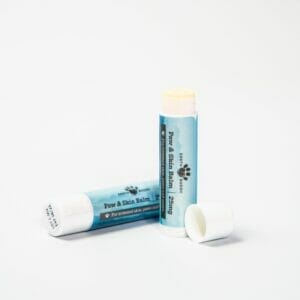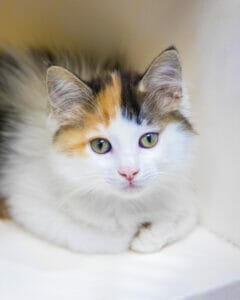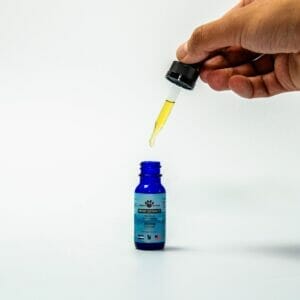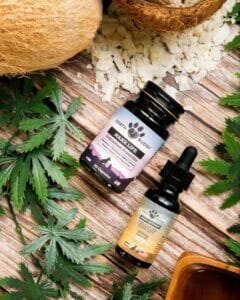
Coconut oil isn’t just for people; it can be a versatile and beneficial addition to your cat’s wellness routine as well. The benefits range from promoting a glossy coat to assisting in the digestion and absorption of essential nutrients. Plus, it’s not difficult to administer, making coconut oil for cats an easy addition to their daily routine.
Coconut Oil for Cats
Coconut oil contains a variety of fatty acids, which contribute to its various health benefits for dogs and cats. The oil is particularly rich in saturated fats, and its composition includes the following types of fatty acids:
- Lauric acid: This is the primary fatty acid in coconut oil, making up about 45-50% of the total fat content.
- Caprylic acid: Another medium-chain fatty acid, caprylic acid promotes the body’s innate resistance to pathogens.
- Capric acid: This medium-chain fatty acid is another component of coconut oil that helps support proper balance of normal intestinal flora.
- Myristic acid: This saturated fat contributes to the hardness of coconut oil and also helps support healthy GI function.
- Palmitic acid: While not as high in concentration as lauric acid, palmitic acid is another saturated fatty acid found in coconut oil.
- Stearic acid: This is a long-chain saturated fatty acid that is less abundant in coconut oil but still present in small amounts.
- Oleic acid: This is a monounsaturated fatty acid that is also found in olive oil. It’s present in smaller amounts in coconut oil.
- Linoleic acid: This is a polyunsaturated fatty acid, present in very small amounts in coconut oil.
- Caproic acid: This is a short-chain fatty acid that has some antimicrobial properties.
- Arachidic acid: This is a long-chain saturated fatty acid present in trace amounts in coconut oil.
Different types of coconut oil (virgin, refined, etc.) may have variations in their fatty acid content, but lauric acid is generally the most abundant, followed by other medium-chain fatty acids like caprylic and capric acids. These acids contribute to the oil’s various potential health benefits
1. Cat’s Skin and Coat Health
Coconut oil can add luster and shine to coats, providing a natural, chemical-free way to promote a healthy coat and skin. Rich in fatty acids, particularly lauric acid, coconut oil may soothe a cat’s skin-related issues associated with seasonal allergies.
When it comes to a cat’s coat, regular application of coconut oil can make a noticeable difference. It nourishes the hair follicles, helping cats achieve a soft, silky, shiny, and healthy coat. Many pet owners find that incorporating coconut oil into their grooming routine not only enhances the aesthetic appeal of their cat’s fur but also promotes healthy skin and good coat color.
2. Adding Coconut Oil For Dental Health
Coconut oil has been said to promote healthy teeth in people, and that extends to feline dental health as well. Coconut oil contains ingredients to support healthy teeth and gums. Lauric acid, in particular, can promote normal periodontal health.
When applied directly to the teeth and gums, it can support gum tissue health and normal periodontal functions. Some pet owners even make homemade toothpaste with coconut oil as the primary ingredient. Additionally, coconut oil supports a healthy inflammatory response that may relieve occasional discomfort.
3. Benefits of Coconut Oil For Hairballs
Coconut oil may help prevent and eliminate hairballs in cats. Its lubricating properties can assist in the smooth passage of hair through the digestive system, reducing the likelihood of hair accumulating and forming a ball.
Given its high fat content, coconut oil coats the ingested fur, making it easier for your cat to expel it either through feces or by vomiting, but in a less disruptive manner than a traditional hairball. Providing your cat coconut oil may also help reduce the occurrence of future hairballs.
4. Benefits of Coconut Oil For Digestive Health
Coconut oil can be a beneficial addition to your cat’s diet when it comes to digestion. It’s rich in medium-chain fatty acids, which are easier for cats to metabolize compared to other fats. This can support healthy digestion and the absorption of essential nutrients, as well as digestive tract health.
Adding a small amount of coconut oil to their cat’s food can support normal bowel function. Plus, it can offer the following additional benefits:
- Help maintain proper gut flora
- Promotes intestinal well-being
- Supports bacteria in the intestinal tract
5. Cat’s Immune System Health
Coconut oil supports a healthy immune system in all animals. It’s packed with medium-chain fatty acids like lauric acid, which enhance the immune response. These qualities can promote the body’s innate resistance to pathogens. Coconut oil also has:
- Immune-enhancing benefits: Chronic inflammation can strain the immune system. Coconut oil provides nutritional support for healthy immune function.
- Supports gut health: Most of the immune system is housed in the gut. Coconut oil promotes normal GI health and function, helping keep animals in peak condition.
6. Offer Cats Coconut Oil for Antioxidants
Antioxidants help maintain normal DNA and the immune system. They have been shown to aid in the elimination of unstable oxygen molecules called free radicals. While coconut oil is not as rich in antioxidants as some other oils, such as olive oil, it does contain vitamin E, which helps decrease oxidative damage.
The inclusion of antioxidants in a cat’s diet can support normal bodily functions by supporting the immune system and promoting long-term health. In that context, the moderate use of coconut oil could potentially offer benefits for cats similar to those it provides for humans. However, it’s important to note that antioxidants are most effective when part of a balanced diet that includes a variety of foods rich in different types of antioxidants.
7. Benefits of Coconut Oil For Brain Health
Coconut oil contains medium chain triglycerides (MCTs), which are a type of fatty acid that can be easily absorbed and converted into energy by the liver. These medium chain triglycerides produce ketones, which are an alternate energy source for the brain. Ketones may enhance your pet’s brain function, potentially helping support the cognitive function of animals, including your cat.
While definitive studies on cats are limited, the use of medium chain fatty acids in other species has shown promise for supporting normal brain and nerve function, which is particularly helpful for senior pets as it provides supporting nutrients for the health of aging animals.
In addition to these neurological benefits, MCTs may help with the following:
- Neuroprotection: The fatty acids in coconut oil can act as antioxidants, which have been shown to aid in the elimination of unstable oxygen molecules called free radicals. This process promotes normal, healthy brain activity.
- Healthy inflammatory response: Coconut oil can promote a normal, healthy inflammatory response in the brain and provide supporting nutrients for the health of aging animals.
8. Weight Management to Promote Lean Body Mass
Coconut oil has gained attention as a potential aid in feline weight management and lean body mass due to its unique composition of medium-chain triglycerides (MCTs). Unlike long-chain triglycerides found in other fatty substances, MCTs support the metabolic functioning of the liver, promote energy production, and help maintain the general health of all ages and breeds.
These benefits support proper weight management when used as part of a balanced diet. The satiating quality of coconut oil can support weight loss and a healthy appetite in cats as well. Don’t overfeed your cat coconut oil. Too much coconut oil could lead to weight gain rather than assist with weight management. Cats can eat coconut oil by adding the appropriate amount to their cat food. Cat owners should bring their cats to the vet to check their body weight annually or as-needed.
Choosing a High-Quality Coconut Oil For Cats
Selecting the right food grade coconut oil for your feline family member is crucial for maximizing its potential health benefits. Here are some tips on how to pick high-quality coconut oil:
- Go organic: Organic coconut oil is free from pesticides and other chemicals, making it the safest choice for your cat. Check for a USDA Organic seal or equivalent certification from your country to ensure the product’s quality.
- Choose virgin or extra virgin: Virgin coconut oil is made from the first pressing of fresh, raw coconut without the use of high temperatures or chemicals. This preserves the oil’s natural properties and nutrients, making it the most beneficial option.
- Look for cold-pressed: Cold-pressed coconut oil retains more of its natural benefits, including antioxidants and anti-inflammatory properties, as it is processed at lower temperatures.
- Check the ingredient list: The ingredient list should be short and straightforward. The only ingredient should be coconut oil, unless it’s combined with another beneficial compound like hemp extract. Avoid any products that contain additives, preservatives, or artificial flavors.
- Opt for glass jars: Plastic containers can leach chemicals into the oil over time, especially if stored at hot or varying temperatures. Choose coconut oil that comes in a glass jar for better quality and a longer shelf life.
- Consider the source: Choose a reputable brand known for producing high-quality products. Read reviews and ask for recommendations to find a trustworthy source for your coconut oil.
- Read the label for Non-GMO Verification: To ensure you are getting a product free from genetically modified organisms, look for a company that produces products that are Non-GMO.
- Smell and taste test: Quality coconut oil should have a subtle, pleasant coconut aroma and taste. If the oil has an off-putting or stale odor, it could be rancid and should be avoided.
Coconut Oil in Organic CBD for Cats
Coconut oil and organic cbd are sometimes combined in tinctures designed for both human and pet use. The mixture of MCT Oil from coconuts and cbd for cats aims to offer the benefits of both ingredients, delivering a holistic approach to wellness. Here’s how they may work together:
Coconut Oil For Cats And Enhanced Bioavailability
The concept of bioavailability refers to the amount of a substance that enters circulation when introduced into the body, thereby having an active effect. In the case of a combination of coconut oil and organic cbd, enhanced bioavailability means that the body can absorb and utilize these compounds more efficiently than if they were administered separately.
Coconut oil contains high levels of saturated fats, which are excellent carriers for hemp compounds like CBD. These fatty acids provide a binding agent for the cannabinoids, enhancing their solubility in water. This makes it easier for these compounds to pass through cellular membranes and enter the bloodstream, thereby increasing their overall bioavailability.
In simpler terms, the fatty acids, like medium chain triglycerides, in coconut oil make it easier for the body to absorb the hemp extract. This is especially important for substances like CBD, which are fat-soluble and therefore require fats to be effectively absorbed by the gastrointestinal tract. When coconut oil and cannabinoids from hemp are combined into a single tincture or capsule, the coconut oil effectively “carries” the hemp compounds, allowing them to be more readily absorbed and utilized by the body and brain.
The combination of these two natural products can therefore offer a more efficient and potentially more effective way to gain the benefits of both.
Palatability of Coconut Oil and CBD For Cats
Coconut oil’s naturally pleasant flavor and smooth texture can significantly enhance the palatability of CBD oil, especially for cats who find the earthy taste of hemp less than appealing. The mild, slightly sweet profile of coconut oil can mask the stronger, grassier notes of cannabinoids, making the combination more enjoyable to consume. This is particularly useful for cats that are incredibly picky eaters.
Is Coconut Oil Safe For Cats?
Now that you’ve read through the benefits, you’re likely wondering if coconut oil is safe for cats, especially if you’re thinking of feeding your cats coconut oil soon. While coconut oil is generally considered safe for most cats when used in moderation, it’s important to consult your veterinarian if your cat is sensitive to certain ingredients.
Coconut oil is high in saturated fats, which could contribute to weight gain or other metabolic issues if given in excessive amounts. It should not replace a balanced diet or any medications prescribed by a veterinarian.
Why Not Fish Oil?
Although fish oil contains essential fatty acids, it’s not often a recommended product unless you plan to use it quickly. The significant concern regarding the use of fish oil is its susceptibility to oxidation, leading to rancidity. All the health benefits are lost when the oxidation process is complete.
Coconut oil is less prone to rancidity than fish oil due to its chemical composition and structure. Specifically, coconut oil is primarily composed of saturated fatty acids, while fish oil is largely made up of polyunsaturated fatty acids. Saturated fats have all their carbon atoms saturated with hydrogen atoms, which makes them less reactive and more stable.
Some cats may also find coconut oil to be more palatable than fish oil, which can have a strong odor, whereas coconut oil has more of a neutral flavor. Even if your cat isn’t particularly fond of it, they’re more likely to tolerate coconut oil.
For further reading, we recommend:
You Might Also Enjoy
Your dog’s skin is their largest organ making dog skin care a crucial part of…
Like us, our dogs, and other mammalian species, cats have an endocannabinoid system. This system…
Learning how to calm a dog down is an essential skill to have in your…








